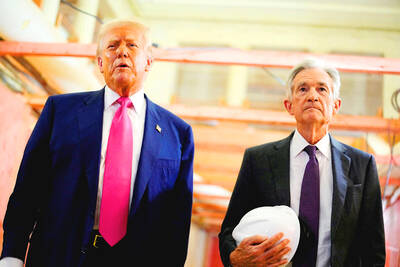Share prices of HTC Corp (宏達電), Asia’s second-largest smartphone maker, fell the most in two months in Taipei trading after forecasting first-quarter revenues that missed analyst estimates as it faces tougher competition in the US.
HTC share prices dropped by its 6.9 percent daily limit, the most on an intraday basis since Dec. 5 last year, ending trading at NT$513.
Trading volume was double the three-month daily average. Sales this quarter will be NT$65 billion (US$2.2 billion) to NT$70 billion, the Taoyuan-based company said on Monday. That is the lowest since the second quarter of 2010 and below the NT$84.9 billion average of 14 analyst estimates.
Competition from Apple Inc’s iPhone and Samsung Electronics Co’s Galaxy models damped demand for HTC devices in the US, while sales of faster LTE fourth-generation models did not meet expectations, chief financial officer Winston Yung (容覺生) said on Monday.
New models will be released next quarter, prompting the weak guidance this period as the company awaits “product transition,” Yung said.
“HTC is likely to lose further economies of scale in manufacturing in 2012 and 2013, as we forecast its shipments for 2012 to decline further to one-third of those of Samsung and Apple, down from half for 2011,” Alex Chang, an analyst at Daiwa Capital Markets in Taipei, wrote in a report yesterday.
Daiwa downgraded the stock to “sell” from “hold” and lowered the six-month target price to NT$333.
HTC became the largest smartphone maker in the US during the third quarter as consumers awaited the next iPhone model, according to data from researcher Canalys. HTC cut its fourth-quarter sales outlook on Nov. 23 by more than 20 percent, citing competition from the iPhone 4S.
Thirteen of 35 analysts tracked by Bloomberg now recommend investors sell the stock, with eight saying “buy” and 14 advising to “hold.”
HTC will release new models at the Mobile World Congress to be held in Barcelona, Spain, beginning on Feb. 27, Yolanda Wang, a Taipei-based analyst at HSBC Holdings PLC, wrote in a report.
She maintained her “underweight” rating on the stock and cut her price estimate 6 percent to NT$386.
Share prices, which have risen 4 percent this year, dropped 42 percent last year and are down more than 58 percent from their peak in April last year.

IN THE AIR: While most companies said they were committed to North American operations, some added that production and costs would depend on the outcome of a US trade probe Leading local contract electronics makers Wistron Corp (緯創), Quanta Computer Inc (廣達), Inventec Corp (英業達) and Compal Electronics Inc (仁寶) are to maintain their North American expansion plans, despite Washington’s 20 percent tariff on Taiwanese goods. Wistron said it has long maintained a presence in the US, while distributing production across Taiwan, North America, Southeast Asia and Europe. The company is in talks with customers to align capacity with their site preferences, a company official told the Taipei Times by telephone on Friday. The company is still in talks with clients over who would bear the tariff costs, with the outcome pending further

NEGOTIATIONS: Semiconductors play an outsized role in Taiwan’s industrial and economic development and are a major driver of the Taiwan-US trade imbalance With US President Donald Trump threatening to impose tariffs on semiconductors, Taiwan is expected to face a significant challenge, as information and communications technology (ICT) products account for more than 70 percent of its exports to the US, Chung-Hua Institution for Economic Research (CIER, 中華經濟研究院) president Lien Hsien-ming (連賢明) said on Friday. Compared with other countries, semiconductors play a disproportionately large role in Taiwan’s industrial and economic development, Lien said. As the sixth-largest contributor to the US trade deficit, Taiwan recorded a US$73.9 billion trade surplus with the US last year — up from US$47.8 billion in 2023 — driven by strong

AI: Softbank’s stake increases in Nvidia and TSMC reflect Masayoshi Son’s effort to gain a foothold in key nodes of the AI value chain, from chip design to data infrastructure Softbank Group Corp is building up stakes in Nvidia Corp and Taiwan Semiconductor Manufacturing Co (TSMC, 台積電), the latest reflection of founder Masayoshi Son’s focus on the tools and hardware underpinning artificial intelligence (AI). The Japanese technology investor raised its stake in Nvidia to about US$3 billion by the end of March, up from US$1 billion in the prior quarter, regulatory filings showed. It bought about US$330 million worth of TSMC shares and US$170 million in Oracle Corp, they showed. Softbank’s signature Vision Fund has also monetized almost US$2 billion of public and private assets in the first half of this year,

POWELL SUCCESSOR: US Fed Governor Adriana Kugler’s resignation gives Donald Trump an opening on the board, potentially accelerating his decision on the next chair US President Donald Trump suddenly has a chance to fill an opening at the US Federal Reserve earlier than expected, after Fed Governor Adriana Kugler announced her resignation on Friday. It might also force him to pick the next Fed chair months sooner than he had anticipated. “The ball is now in Trump’s court,” LH Meyer/Monetary Policy Analytics Inc economist Derek Tang said. “Trump is the one who’s been putting pressure on the Fed to do this and that, and Trump says he wants to have his own people on. So now he has the opportunity.” Kugler’s exit unfolds amid unprecedented public pressure